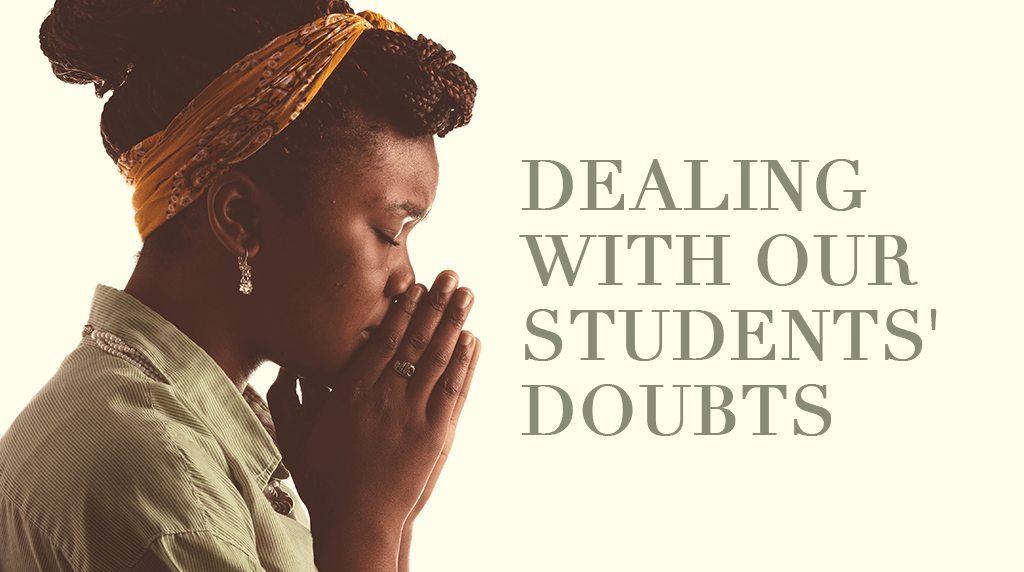
Dealing With Our Students' Doubts
One of the main tasks of youth workers, in my opinion, is to help play a role in leading teenagers to take more ownership of their faith. And as I speak to teenagers and youth workers about this transition to greater faith ownership, the question of doubt inevitably comes up. Often.
One of the major aspects of our teenagers owning their faith is dealing with doubts, or dealing with questions they have about God or some aspect of their faith.
Questions about the essentials of their faith, and to a lesser extent, doubts, are a healthy part of faith development. As leaders, we should encourage students to wrestle with the questions they have. Even as this might make us uneasy, it’s important to help students walk down this road.I love this quote from Henry Drummond:
“Christ distinguished between doubt and unbelief. Doubt says, ‘I can’t believe.’ Unbelief says, ‘I won’t belief.’ Doubt is honest. Unbelief is defiant.”
Honest doubt, and honest questioning is how teenagers begin to own a faith that is theirs, not their parents’, or grandparents’, or even yours. In the past, I have told students that if they are not asking questions of their faith, they’re not trying hard enough. They’re not thinking about it enough. They’re not digging deeply enough. That’s why questioning is part of owning our faith.
But what do we do with our questions? What is the right attitude or approach toward having these questions or doubts?
Here are a few takeaways:
1. Look To Scripture For Examples.
There are dozens of examples of people questioning or doubting God in Scripture. 100-year-old Abram questioned God’s ability to give him a son (Genesis 17:15-17). Abraham questioned God when God said He was going to destroy Sodom (Genesis 18:22-25). David questioned God dozens of times (Psalm 13:1-2; Psalm 22:1). The OT prophet Habakkuk questioned God’s goodness. John the Baptist doubted his mission and God’s call on his life (Luke 7:18-20). And you know what? God didn’t smite them. God didn’t call down fire on them. God walked with them through their doubts and questions. And in the end, their faith was strengthened.
2. Pursue Answers
The second way to deal with our questions comes from a guy near and dear to my heart, the great Dr. Tim Keller. Keller writes a great bit about faith and doubt. I love this quote: “A person’s faith can collapse overnight if he or she has failed over the years to listen patiently to his or her own doubts. As Christians, we should acknowledge and wrestle with our doubt. It is no longer sufficient to hold beliefs just because you inherited them.”
We have to encourage students to own their questions. To acknowledge them. To look at them from every different angle. To make it their mission to discover as much as they can about their questions until they are satisfied that they have taken it as far as they can take it. Many of our questions don’t have answers that make us feel good. But, all of our questions, all of our doubts, can be answered in God. Which leads to my next point . . .
3. Be Comfortable Knowing God, But Not Knowing All Of God
In the end, while we can know so much about God and His ways, we will never know all of Him and His ways. That God made Himself knowable to us is amazing. But He will always remain completely unknowable. Isaiah 55:9 God says: “As the heavens are higher than the earth, so are my ways higher than your ways and my thoughts than your thoughts.” Exodus 15:11 says: “Who among the gods is like you, O LORD? Who is like you— majestic in holiness, awesome in glory, working wonders?
There will always be aspects of God that we can’t fully know. But in seeking to understand God and His ways, we will grow to know Him more than we can ever imagine. There is tension here, for sure. But there is assurance as well.
4. Our Biggest Doubts And Questions About God Don’t Change Who He Is.
We may question God and we might find that the answers we find don’t solve any pain we feel or our need for nice neat resolution. But this doesn’t change who God is. We may question why God allows suffering. But we can’t deny that He is a loving God who goes to great lengths to save us. We may question God’s plan, but He is still sovereign. We may question God allowing bad things to happen to good people, but He is still compassionate. We may question why we don’t feel close to God, but it doesn’t change the fact that He is always near to us, eternally unchanging, and deeply and madly in love with each of His children. Our doubts, our questions, don’t change who God is.
The doubts and questions of our teenagers can sometimes feel big and scary. But only to us. They don't scare God.
God welcomes the faith-insecurities of our teenagers. And once we help them see this, we help them grow toward a faith that is more authentic.
Note: This post was originally published November 2015 and has been revamped and edited for accuracy and comprehensiveness.




Leave a comment